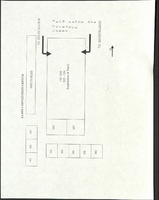Search the Special Collections and Archives Portal
Search Results
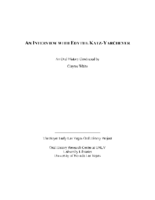
Transcript of interviews with Edythe Katz-Yarchever by Claytee White, 2000-2005
Date
Archival Collection
Description
Transcript of interviews with Edythe Katz-Yarchever by Claytee White over the course of several sessions in 2000, 2003 and 2005. In the interviews, Katz-Yarchever discusses her life in Las Vegas, owning theaters with her husband, Lloyd Katz, and the strides they made in civil rights. She talks about her service in Civil Defense and the National Guard, and moving to various places, then working in California and meeting her husband, Lloyd. The Katzes became involved in the community in various ways with Operation Independence and Holocaust education. About a decade after Lloyd's death, Edythe married Judge Gilbert Yarchever.
Edythe Katz-Yarvhever was born in Boston, a second generation American whose grandparents left Russia the century before. Edythe completed finishing school at the start of World War II and worked various jobs at home before joining the Civil Defense, and later, the National Guard. She moved to Maryland and got a job as a secretary at Edgewood Arsenal, then transferred to Cushing General Hospital to assist a Marine Corps neurologist, who was also a Jewish refugee. Towards the end of the war, she is transferred to an Army hospital in Hawaii, and thus began the rest of her life on the West Coast. When the war ended, Edythe sailed to California and worked various jobs in Los Angeles: in the secretarial pool at MGM Studios, for a casting agency and for a hotel magazine. Edythe met Lloyd Katz in San Francisco, and the two were married after a short courtship. The couple lived in San Francisco before moving to Las Vegas in 1951, where they took over the management of the Huntridge, Palace and Fremont theaters, then leased by Edythe's parents. The Katzes took a stand to desegregate their theaters, allowing black customers to sit with white patrons. Edythe and Lloyd became active in the city's Civil Rights Movement, including work with Operation Independence and the NAACP. Edythe started organizations like Volunteers for Education and Junior Art League, and directed an interfaith, interracial preschool. Lloyd would frequently open up their theaters to organizations to hold fundraisers, free-of-charge. Edythe was extremely active in the local Jewish community, including opening the city's first Jewish gift shop, serving as sisterhood president at her synagogue and starting the Jewish Reporter. She later founded a library for Holocaust education as well as assisted the school district's development of curriculum and teacher training relating to the Holocaust. Lloyd Katz passed away in 1986, and in 1995, Edythe married Gilbert Yarchever. Edythe and Lloyd's community service work was honored with the naming of their school, the Edythe and Lloyd Katz Elementary School, where Edythe still remains active.
Text
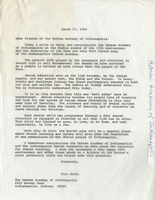
Alma Vining oral history interview
Identifier
Abstract
Oral history interview with Alma Vining conducted by Christine Carrera on April 10, 2006 for the Public School Principalship Oral History Project. In this interview, Vining reflects upon her 30-year career as an elementary school teacher and administrator with Nevada’s Clark County School District (CCSD) from the 1970s to the 2000s. She describes the process by which she became an administrator, her regular responsibilities, and challenges that she faced. She also discusses school district programs such as No Child Left Behind, bilingual education, and school integration.
Archival Collection
Jack Wesley Day oral history interview
Identifier
Abstract
Oral history interview with Jack Wesley Day conducted by Claytee D. White on August 19, 2015 for the Boyer Early Las Vegas Oral History Project. Day begins by discussing his upbringing and his service in the United States Army. He describes moving to Las Vegas, Nevada in 1961 to work as a teacher at Rancho High School before joining the Clark County School District administration in 1963. Day talks about race relations at Rancho High School, life in Las Vegas during the 1960s, and being the coordinator for manpower development training classes between the Nevada Department of Education, the federal government, and the Clark County School District. Day also describes the early years of Vo-Tech High School and other aspects of the history of Clark County School District, as well as his experiences working for the district.
Archival Collection

Meeting minutes for Consolidated Student Senate, University of Nevada, Las Vegas, July 10, 1979
Date
Archival Collection
Description
Text
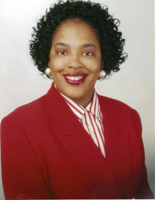
Photograph of Marica Washington, 2007
Date
Archival Collection
Description
Color portrait photograph of Marcia Washington as President of the Nevada State Board of Education, January 2007.
Image
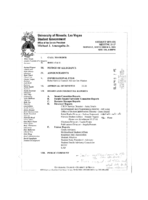
Meeting minutes for Consolidated Student Senate, University of Nevada, Las Vegas, September 08, 2003
Date
Archival Collection
Description
Text
Julio Lucchesi oral history interview
Identifier
Abstract
Oral history interview with Julio Lucchesi conducted by an unidentified interviewer on December 21, 2001. Luchessi discusses his decision to become an architect, as well as his desire to become an aviator. He reads extensively from his autobiography in progess, of his education, his time in the Army Air Corps during World War II, and his decision to move to Nevada. He also talks about the formation and development of the American Institute of Architecture (AIA) in Nevada, his efforts to change the exam process for new architects in the state, and the eleven-year struggle to establish a school of architecture at the University of Nevada, Las Vegas (UNLV) in Las Vegas, Nevada.
Archival Collection
J. D. Smith oral history interview
Identifier
Abstract
Oral history interview with J. D. Smith conducted by Albert Hewitt on October 31, 1979 for the Ralph Roske Oral History Project on Early Las Vegas. Smith begins by discussing his move to Las Vegas, Nevada in 1927 after buying an office for his dental practice. He describes life in Las Vegas at the time, how the city has expanded and changed, and his career as a dentist. Smith also talks about his time as president of the Nevada State Board of Education. He concludes by elaborating on other aspects of Las Vegas history, such as the crash of Carole Lombard's plane, the Helldorado Parades, and nuclear weapons testing.
Archival Collection

